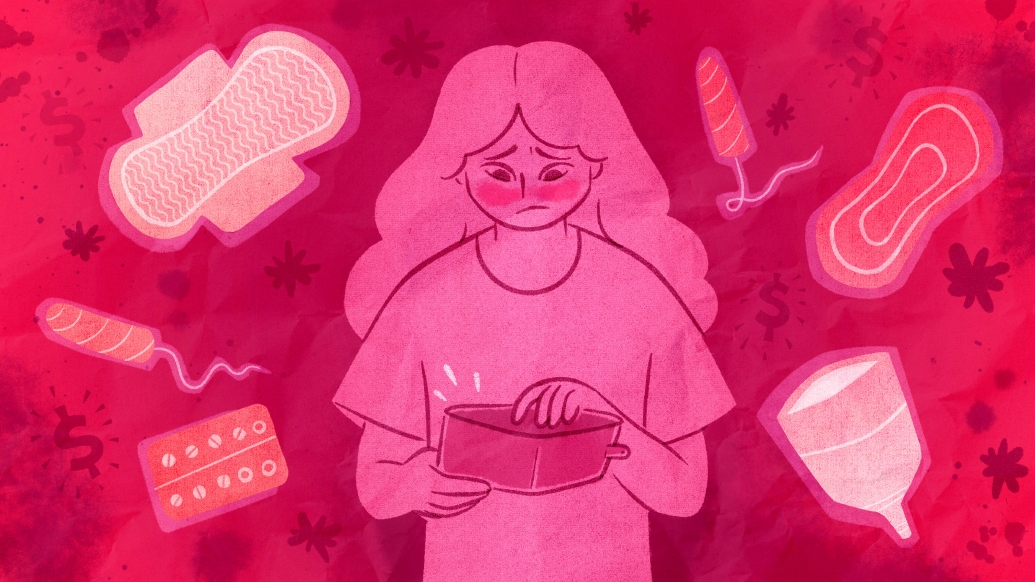Survey focused on how much people in their teens and early 20s know about periods and their experience and attitudes around “period poverty”
11:45 AM
Author |

The subject of menstruation has often been considered taboo.
Even though billions of people around the world menstruate, periods are still not often openly discussed. But new Michigan Medicine research delves into why some people feel this way, while others don’t. The study could help inform menstruation related public policy.
Clara Wolff, the study’s lead author and a third-year undergraduate student at the University of Michigan, sought to learn more about how much young people know about periods and their comfort level in having open discussions about them, as well as their experiences with and knowledge of what’s sometimes referred to as “period poverty.”
The study, which was published in the Journal of Adolescent Health, defines period poverty as “the lack of accessible menstrual education or menstrual tools.”
“Period poverty is pervasive, but what young people in America think about it and how they experience it isn't talked about much,” said Tammy Chang M.D., M.P.H, M.S., and an author on this study. “Understanding youth experiences is critical to creating policies that are effective in addressing this important issue.”
Data for this research came from the MyVoice nationwide text poll that surveyed more than 1,000 people aged 14 to 26 across the United States. Survey respondents were prompted to answer five questions to gauge their knowledge and comfort levels with periods and period poverty, using their own language.
Period knowledge
More female respondents than male respondents said they felt knowledgeable about periods, with 83% of female respondents saying yes, compared to 24% of males. Overall, 50% of respondents answered that they did feel knowledgeable.
Those who answered yes, mainly said they had personally experienced a period, received education on the topic, knew people who have experienced a period or did their own research.
“Yes, I feel like my school did a good job educating us on the topic,” one respondent reported. Another reported “Yes, because I have done my own research on menstruation.”
Those who answered no indicated they had no personal experience with a period, had not been educated about it, had no need to learn or mentioned the stigma of discussing periods.
One respondent said they were not knowledgeable because “it is a highly stigmatized issue among the male population.” Another said “I do not feel knowledgeable — I was never taught anything about menstruation. I feel bad about that and want to learn but don’t know how.”
Ever had a conversation about periods?
Of the respondents who answered this question, 74% said that they have had conversations with somebody about periods. Nearly 88% of female respondents and 64% of male respondents said they have engaged in these conversations with relatives, friends, teachers and doctors.
These conversations were about shared experiences and discomfort, advice and education, menstrual products, as well as generic conversations that came up and medical conversations with doctors and other health professionals.
“Yes, I've talked to my brothers about them and made sure they know that they exist and at least the basics of the care that comes with them,” one respondent reported. Another reported “Yes, my friends and I talk often about how much of an inconvenience it is to have a period.”
One of our main findings was that most people were overwhelmingly supportive of these initiatives to make pads and tampons cheaper.”
-- Clara Wolff, study author
Comfort level
A little over half of respondents for this question said they feel comfortable discussing periods with others. More female respondents (63%) than male respondents (42%) said they felt comfortable.
Some respondents said yes because “it’s a natural process” or they believe people should be educated on the topic. Others said it depends on the person they’re talking to or the context and intensity of the conversation. Among those who responded no, some said the conversations would be too awkward or uncomfortable or indicated they were not female.
“I think it varied a lot,” Wolff said. “We had some people who said ‘I’ve been told not to talk about periods,’ or ‘I don’t feel comfortable,’ and then there are some people who responded with a whole paragraph on everything they knew, and they clearly had done their research and were well educated on these things.”
Access to period products
Overall, 19% of respondents said that they or someone they know has had problems accessing period products. Those who said they have personally struggled to access them, cited the price.
An overwhelming majority of respondents (87%) were supportive of making period products easier to get.
“One of our main findings was that most people were overwhelmingly supportive of these initiatives to make pads and tampons cheaper, whether that be giving them out for free, making them tax free or other methods,” Wolff said.
The tax on menstrual products in Michigan was repealed in 2021, but they are still subject to tax in 21 states. The National Conference of State Legislatures is tracking research and policy proposals on the topic. In the meantime, some schools and colleges, including the University of Michigan, have begun placing free menstrual products in restrooms. And multiple nonprofit organizations are working to raises awareness of, and access to, affordable sources of menstrual products.
Additional authors: Marika Waselewski, M.P.H, Xochitl Amaro, Chichi Amanze, and Abby Frank
Citation: “Youth Perspectives and Experiences With Menstruation and Period Poverty,” Journal of Adolescent Health. DOI: https://doi.org/10.1016/j.jadohealth.2024.02.018
Sign up for Health Lab newsletters today. Get medical tips from top experts and learn about new scientific discoveries every week by subscribing to Health Lab’s two newsletters, Health & Wellness and Research & Innovation.
Sign up for the Health Lab Podcast: Add us on Spotify, Apple Podcasts or wherever you get you listen to your favorite shows.

Explore a variety of health care news & stories by visiting the Health Lab home page for more articles.

Department of Communication at Michigan Medicine

Want top health & research news weekly? Sign up for Health Lab’s newsletters today!





